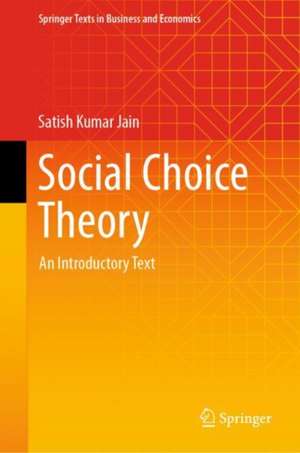Social Choice Theory: An Introductory Text: Springer Texts in Business and Economics
Autor Satish Kumar Jainen Limba Engleză Hardback – 2 noi 2022
| Toate formatele și edițiile | Preț | Express |
|---|---|---|
| Paperback (1) | 483.33 lei 6-8 săpt. | |
| Springer Nature Singapore – 3 noi 2023 | 483.33 lei 6-8 săpt. | |
| Hardback (1) | 523.87 lei 3-5 săpt. | +22.02 lei 5-11 zile |
| Springer Nature Singapore – 2 noi 2022 | 523.87 lei 3-5 săpt. | +22.02 lei 5-11 zile |
Din seria Springer Texts in Business and Economics
- 17%
 Preț: 460.17 lei
Preț: 460.17 lei -
 Preț: 548.25 lei
Preț: 548.25 lei - 17%
 Preț: 490.71 lei
Preț: 490.71 lei - 13%
 Preț: 447.86 lei
Preț: 447.86 lei - 19%
 Preț: 509.83 lei
Preț: 509.83 lei -
 Preț: 360.02 lei
Preț: 360.02 lei -
 Preț: 374.88 lei
Preț: 374.88 lei -
 Preț: 374.15 lei
Preț: 374.15 lei -
 Preț: 185.09 lei
Preț: 185.09 lei - 17%
 Preț: 522.65 lei
Preț: 522.65 lei - 19%
 Preț: 465.61 lei
Preț: 465.61 lei - 15%
 Preț: 642.51 lei
Preț: 642.51 lei - 18%
 Preț: 754.79 lei
Preț: 754.79 lei - 19%
 Preț: 534.44 lei
Preț: 534.44 lei -
 Preț: 360.47 lei
Preț: 360.47 lei -
 Preț: 359.93 lei
Preț: 359.93 lei - 17%
 Preț: 363.29 lei
Preț: 363.29 lei - 17%
 Preț: 363.98 lei
Preț: 363.98 lei -
 Preț: 473.41 lei
Preț: 473.41 lei -
 Preț: 361.12 lei
Preț: 361.12 lei - 8%
 Preț: 428.31 lei
Preț: 428.31 lei - 15%
 Preț: 479.55 lei
Preț: 479.55 lei - 13%
 Preț: 490.93 lei
Preț: 490.93 lei - 15%
 Preț: 650.55 lei
Preț: 650.55 lei -
 Preț: 382.19 lei
Preț: 382.19 lei - 15%
 Preț: 562.13 lei
Preț: 562.13 lei -
 Preț: 367.41 lei
Preț: 367.41 lei -
 Preț: 401.79 lei
Preț: 401.79 lei -
 Preț: 361.89 lei
Preț: 361.89 lei - 15%
 Preț: 562.31 lei
Preț: 562.31 lei - 17%
 Preț: 491.52 lei
Preț: 491.52 lei - 20%
 Preț: 819.24 lei
Preț: 819.24 lei - 15%
 Preț: 597.20 lei
Preț: 597.20 lei -
 Preț: 320.05 lei
Preț: 320.05 lei - 20%
 Preț: 694.03 lei
Preț: 694.03 lei - 20%
 Preț: 693.46 lei
Preț: 693.46 lei -
 Preț: 548.53 lei
Preț: 548.53 lei - 17%
 Preț: 459.67 lei
Preț: 459.67 lei - 17%
 Preț: 366.16 lei
Preț: 366.16 lei - 20%
 Preț: 693.82 lei
Preț: 693.82 lei -
 Preț: 555.90 lei
Preț: 555.90 lei - 9%
 Preț: 766.64 lei
Preț: 766.64 lei
Preț: 523.87 lei
Preț vechi: 631.17 lei
-17% Nou
Puncte Express: 786
Preț estimativ în valută:
100.26€ • 104.28$ • 82.77£
100.26€ • 104.28$ • 82.77£
Carte disponibilă
Livrare economică 24 martie-07 aprilie
Livrare express 08-14 martie pentru 32.01 lei
Preluare comenzi: 021 569.72.76
Specificații
ISBN-13: 9789811696602
ISBN-10: 9811696608
Pagini: 200
Ilustrații: XVII, 200 p.
Dimensiuni: 155 x 235 x 20 mm
Greutate: 0.49 kg
Ediția:1st ed. 2022
Editura: Springer Nature Singapore
Colecția Springer
Seria Springer Texts in Business and Economics
Locul publicării:Singapore, Singapore
ISBN-10: 9811696608
Pagini: 200
Ilustrații: XVII, 200 p.
Dimensiuni: 155 x 235 x 20 mm
Greutate: 0.49 kg
Ediția:1st ed. 2022
Editura: Springer Nature Singapore
Colecția Springer
Seria Springer Texts in Business and Economics
Locul publicării:Singapore, Singapore
Cuprins
Introduction.- Elementary Logic.- Sets, Relations, Functions.- Binary Relations.- Social Choice Theoretic Framework and Arrow Impossibility Theorem.- Some Important Value-Judgments, Rules and Theorems.- Implications of Weakening of Some of Arrow Conditions.- The Method of Majority Decision: Conditions for Transitivity and Quasi-Transitivity.- Strategic Aspects.- Summary and Concluding Remarks.
Notă biografică
Satish K. Jain is an economist. He was on the faculty of the Centre for Economic Studies and Planning of Jawaharlal Nehru University from 1978 to 2016; and was Reserve Bank of India Chair Professor at the time of superannuation in 2013. He was Indian Council of Social Science Research National Fellow during 2016-18. He has authored Economic Analysis of Liability Rules (Springer, 2015) and Domain Conditions and Social Rationality (Springer 2019); has edited Law and Economics (Oxford University Press, 2010), and co-edited Economic Growth, Efficiency, and Inequality (with Anjan Mukherji, Routledge, 2015.). His teaching and research interests include social choice theory, and law and economics.
Textul de pe ultima copertă
This introductory textbook on social choice theory makes the social choice theoretic framework and its main results, that have a direct bearing on the discourses on electoral rules and policy evaluation, accessible to a larger audience. The text is essentially self-contained. No previous knowledge of mathematical logic or relational algebra is assumed. Whatever technical prerequisites are needed, are developed in the text itself. Although the text is at an introductory level, there has been no compromise on rigor. Unlike most introductory books, the relevant proofs are not omitted; rather, they have been explained in detail. The text has a large number of examples so that the concepts and results become clear to the reader. There is a large number of exercises with full solutions provided at the end of the text, so that the reader can check her/his understanding of the material.
Caracteristici
Self-contained with required prerequisites developed in the text itself and can be learnt without an instructor Contains numerous exercises with solutions, and examples to make concepts and results clear Provides high level of rigor notwithstanding the fact that the textbook is at an introductory level
